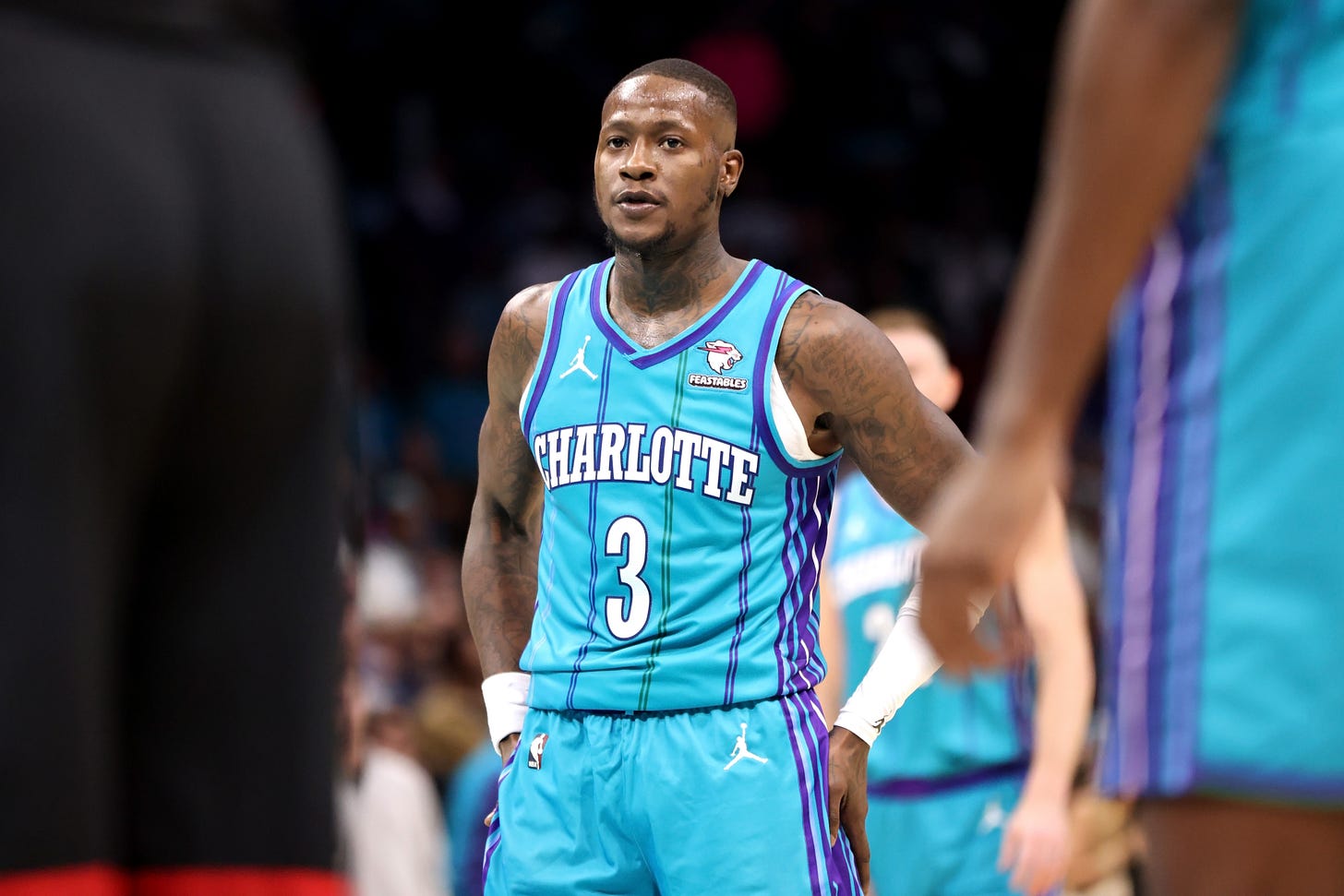Terry Rozier Doesn’t Fit the Usual Profile of Sports Betting Scandals — And Leagues Should Be Worried
Most players caught in gambling scandals have been fringe guys with little to lose. Rozier is different.

Remember all of those folks who warned us about the expansion of legalized sports gambling, and the ripple effects it would have on leagues and players? Well, they seemed to score another told-you-so last week.
According to recent reporting from the Wall Street Journal, current Miami Heat guard Terry Rozier is the latest athlete to be involved in the same federal investigation that got former Toronto Raptor Jontay Porter banned from basketball (and later charged with a felony) last year. And like with Porter, this situation regards unusual betting patterns around player prop bets.
In this case, over/unders for Rozier’s performance in a game in March 2023 were initially posted by sportsbooks, but then were taken down just hours before tip-off. (Presumably because suspicious wagers had been made on those lines while they were up.) Rozier was then pulled out of that game with an injury in the first quarter, never coming close to hitting his game totals — and in fact, ending his 2022-23 season.
This all raised red flags with watchdog organizations and government officials — hence the WSJ report about federal prosecutors conducting an investigation. Though it’s worth noting that the NBA was aware of the unusual activity at the time: “The league conducted an investigation and did not find a violation of NBA rules,” spokesman Mike Bass said in a statement.
As
noted in his summary of the incident, it’s important to emphasize that Rozier hasn’t been accused of anything. There’s no evidence he colluded with gamblers to tank his numbers in that game, or was aware of the prop bets at all. It could just be a giant coincidence, which seems to be what the NBA concluded during its own investigation of the matter.However, if this does end up turning into another Jontay Porter-style situation, it would add a totally new dimension to the growing history of recent player betting scandals.
Porter was symbolic of a common theme that ran across almost all of the players who’d been suspended or otherwise implicated in gambling scandals since the Supreme Court paved the way for expanded legal sports betting in 2018: He was not very good. Through last season, Porter had a career Estimated RAPTOR of -1.2 and produced 0.3 career Wins Above Replacement in 37 career NBA games that were sandwiched around yearslong stints in the G-League. He’d only made $2.4 million in his career, a relatively paltry sum in a league where the average player makes roughly $12 million.
These types of borderline players are primed to engage in betting (so the logic goes), because they actually have financial motive to risk their careers for a gambling payday, and they have the means and opportunity to commit the crime as well. And that logic mostly holds if we look at the history of major pro athletes who have been tied to gambling scandals. Here’s a list of everyone on ESPN’s timeline of recent sports gambling scandals — cross-checked against this other list I found — along with their career earnings (per Spotrac) through the most recent season before the gambling incident was alleged to have happen:
Most of these players had indeed made comparatively very little at the time of their alleged involvement with betting. Some had more potential than others; Calvin Ridley was just a year removed from nearly posting 1,400 yards in a season when he was suspended for betting on NFL games. But even he had earned just $11 million in his NFL career to that point, a number still within the realm of “you gotta pay these guys enough to make gambling not worth it” territory.
Most of the other players on this list had made even less than Ridley, either because they were young players still on early contracts, or simply scrubs barely hanging onto a pro career at all. Before Rozier, the biggest exceptions were a couple of retired players: Former outfielder Yasiel Puig, who made $52 million in MLB but allegedly racked up huge gambling debts with a bookmaker during his career, and ex-NFL player Miles Austin, who had $40 million in career earnings but was suspended for placing bets while a coach for the Jets.
But Rozier’s $109 million in lifetime earnings at the time of the incident — which have since grown to $134 million — dwarf those of anyone else on the list. He is not a fringe player, with several seasons of at least 6 WAR in his résumé to go with a lifetime average over 14 PPG in more than 640 career NBA games. Rozier was supposed to be too good, and more importantly too rich, to get caught up in this kind of thing.
But if a player of Rozier’s level would engage in stat manipulation to rig player props, it opens up even more questions about how long the house of cards built between sports leagues and sportsbooks can stay intact before the whole enterprise collapses on itself.
When gambling controversies were confined to a few desperate outliers, it was easy enough for the leagues and sportsbooks to tell themselves that the problem was manageable. (After all, most fringe players are so insignificant that they don’t even have betting lines, let alone real opportunities for manipulation.) But if this investigation continues to scoop up players of increasing name recognition, the powers that be may soon have to reckon with the reality that the issue isn’t confined to just benchwarmers and G-Leaguers — it might be embedded far deeper within the sport itself.
Filed under: NBA, Miscellany




